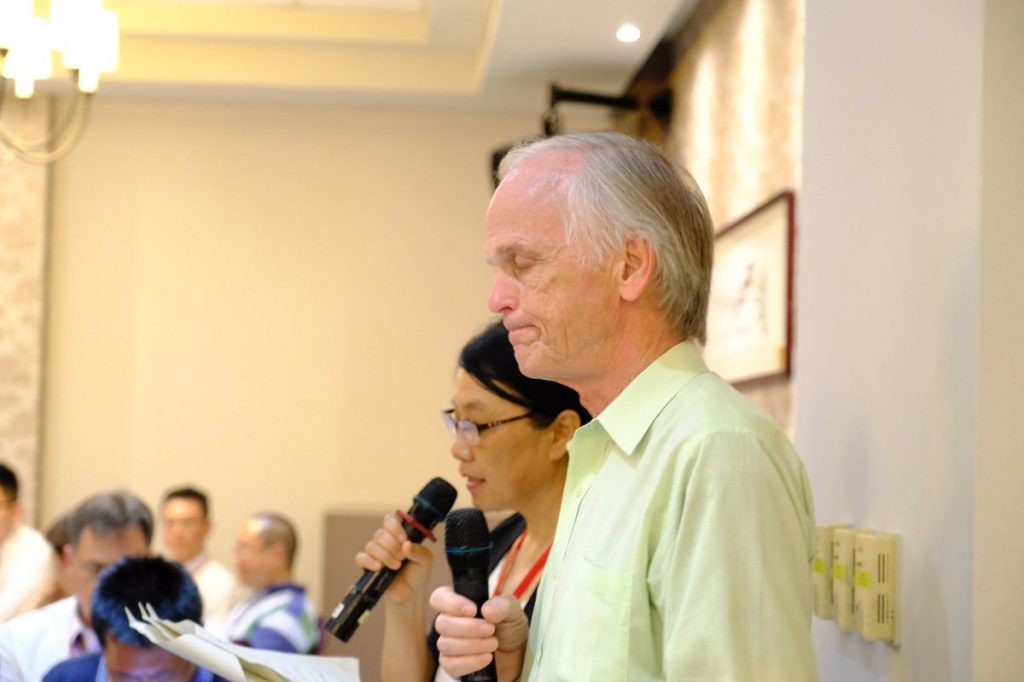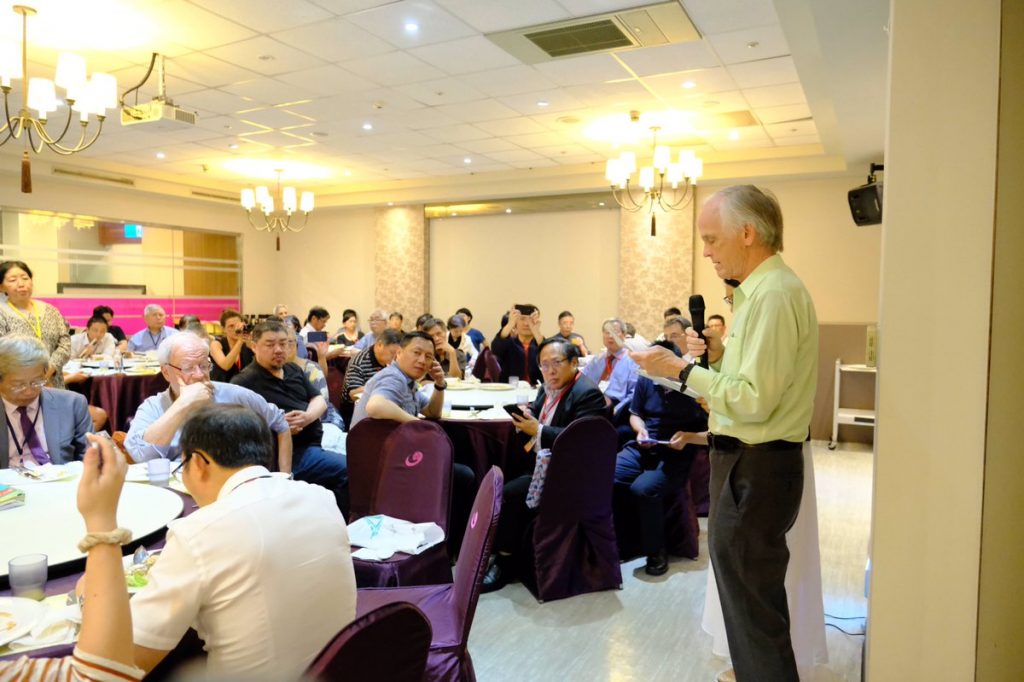林培瑞教授紀念六四詩作:《Why We Remember June Fourth 我们为什么铭记六四》
朗诵者:林培瑞,崔卫平
时间:2019年5月18日
地点:台北市

2019年5月18日晚上晚餐时,林培瑞 Perry Link 和崔卫平 cuiweiping 分别用英文中文朗读纪念六四的诗歌《Why We Remember June Fourth 我们为什么铭记六四》,老头子声音哽咽,令人动容。下面是朗诵视频和原文:
We remember June Fourth because Jiang Jielian was 17 at the time. He is still 17. He will always be 17. People who die do not age.
我们铭记六四,是因为那时候蒋捷连才17岁。今天,他仍然是17岁。他永远是17岁。死去的人不长岁数儿。
We remember June Fourth because the lost souls that haunted Liu Xiaobo until he died will haunt us, too, until we do.
我们铭记六四,是因为那些逝去的亡灵,始终困扰着刘晓波,直到晓波去世;亡灵们也将困扰我们,直到我们也去世。
We remember June Fourth because the glint of bonfires on bayonets is something one does not forget, even if one did not see it personally.
我们铭记六四,是因为刺刀上闪烁的篝火,令人难忘;即使没有亲眼看见过的人,也不会忘记。
We remember June Fourth because it taught us the essential nature of the Communist Party of China when all of the clothes, every shred, falls away. No book, film, or museum could be clearer.
我们铭记六四,是因为它让我们看清了中国共产党的本质。在那会儿,这个党所有的外衣脱落在地,毫无隐藏。没有任何书籍、电影或者博物馆,能够让人看得如此清晰。
We remember June Fourth because of the ordinary workers who died then. We cannot remember most of their names because we do not know most of their names. We never did. But we remember them as people, and we remember that we never knew their names.
我们铭记六四,是因为普通的工人倒了下去。我们不可能记住大多数他们的名字,因为我们不知道他们的名字,从来也不知道。但我们记住了他们作为人的举动,我们也记住了自己始终不知道他们的名字。
We remember June Fourth because the worst of China is there—but the best of China is there, too.
我们铭记六四,是因为这是最坏的中国,但也是最好的中国。
We remember June Fourth because it was a massacre—not just a crackdown, or an “incident,” an event, a shijian, a fengbo; not a counterrevolutionary riot, not a faint memory, and not, as a child in China might think today, a blank. It was a massacre.
我们铭记六四,是因为它是一场大屠杀——不仅是一场镇压;不是一个事故、事件或风波;不是一次反革命暴乱,不是一个模糊的记忆;不是如同今天中国的一个孩子所能够想起的,一片空白。不是别的,是一场大屠杀。
We remember June Fourth because, as Fang Lizhi noted with his characteristic wit, it is the only case he has heard of in which a nation invaded itself.
我们铭记六四,是因为,正如方励之以他的特有的幽默所说的:世界历史上很少有大国侵略他自己。
We remember June Fourth because we want to know what the soldiers who did the killing remember. They were brainwashed on the outskirts of the city before they carried out their deadly orders. So they were victims, too. We do not know what their thoughts were. But we remember that we want to know.
我们铭记六四,是因为我们想知道那些杀人的士兵们, 自己有什么记忆。 在执行凶狠的命令之前,他们在北京的郊区被洗脑,以为是要平息暴徒。因此这些普通兵也是受害者。我们不知道他们头脑中想过什么。但是我们记得我们想知道。
We remember June Fourth because Ding Zilin is still alive. She is 82 years old. When she goes out, plainclothes police follow to provide security. Security for her? No, security for the state. That’s right, a regime with 100 trillion yuan in GDP and two million soldiers needs protection from an 82-year-old lady. Protection from her ideas. This is worth remembering.
我们铭记六四,是因为丁子霖还活着。她82岁了。她走到哪儿,便衣警察跟到哪儿。为的是安全。丁教授的安全吗? 不是。为的是国家的安全。没错,一个拥有千亿元GDP和两百万军队的政权,竟然需要保护自己免受一个82岁老太太的伤害。怕的不是他的力气,是她脑子里的想法。那想法是有力量的。这是我们值得铭记的。
We remember June Fourth in order to support others who remember. We remember alone. But we remember together, too.
我们铭记六四,是因为要支持其他的想记住的人们。我们各自记住。但也是跟朋友们一道记住。
We remember June Fourth because remembering it makes us better people. Remembering is in our personal interests. When politicians talk about “interests” they mean material interests. But moral interests are just as important–no, they are more important. More important than owning a yacht.
我们铭记六四,是因为记忆对我们自己有好处。是我们自己的利益。 政治提到“利益”总是物质利益。然而精神上,道德上的利益同样重要——不,更加重要。比拥有一艘游艇重要得多。
We remember June Fourth because it was an historic turning point for one-fifth of the world. A turning point in a frightening direction. We hope it won’t be so much of a turning point as to throw the whole world into a ditch. But we don’t know. We’ll have to see.
我们铭记六四,是因为六四是五分之一世界的历史转折点。是一个朝向可怕的方向的转折。我们不希望看到,这也是把世界带到沟里去的那样一个转折。但我们不知道。真的不知道。得走着瞧。
We remember June Fourth because, if we didn’t remember it, it could not be in our heads any other way. Could we possibly have imagined it? No.
我们铭记六四,是因为只有通过记性,这种事儿才能在脑子里存在。 难道能够想像得出来吗?
We remember June Fourth because there are people who dearly want us to remember. It comforts them to know that we remember.
我们铭记六四,是因为有些人非常希望我们记住。我们记住,对他们是莫大的安慰。
We remember June Fourth because there are also people who desperately want us not to remember. They want us to forget because forgetting helps to preserve their political power. How foul! We would oppose that power even if remembering massacres were the only way to do it.
我们记住六四,是因为另外有些人非常愿意看到我们遗忘。 遗忘有利于他们维持政权。多么卑污!哪怕记得屠杀是我们抵制独裁的唯一方法,我们还是得记得,还是得抵制。
We remember June Fourth in order to remind ourselves of the way the Chinese government lies to itself and to others. It says the Chinese people have long since made their “correct judgment on the 1989 counterrevolutionary riot at Tiananmen Square.” But each year, at June Fourth, plainclothes police block people from entering the Square. Why? If the Chinese people all believe what the government says they believe, then why not let the people into the square to denounce the counterrevolutionaries? The presence of the police shows that the regime does not believe its own lies.
我们铭记六四,是因记忆能提醒我们中国政府撒谎的方式。它自己都不信自己的谎言。 说中国人民早就对“天安门广场上的反革命暴乱作出了正确的判断”。但是每年的六四,便衣警察阻止人们进入天安门广场。 为什么?–假如中国老百姓真的做了政府宣扬他们做了的所谓“判断,” 那为什么不让人家进入广场去谴责反革命分子?警察的在场,说明政权不相信自己的谎言。
We remember June Fourth because shocks to the human brain last a long time. We would not be able to forget even if we tried.
我们铭记六四,是因为人脑受到巨大冲击之后,需要很长很长的时间才能开始恢复。哪怕我们下决心从明天开始遗忘,也肯定忘不了。
